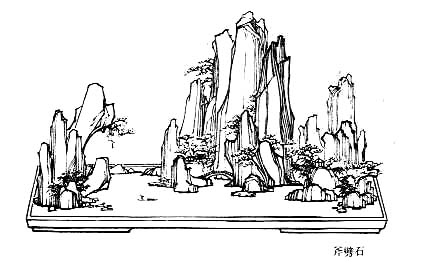Dao De Jing 
 – The Way and Its Power
– The Way and Its Power
The naturalist, individualist and politic doctrine of Lao-tse exhibited in 81 poetic and obscure texts. Tr. Waley (en), Lau (en), Julien (fr) and Wilhelm (de).
| 1 | 2 | 3 | 4 | 5 | 6 | 7 | 8 | 9 | 10 | 11 | 12 | 13 | 14 | 15 | 16 | 17 | 18 | 19 | 20 | 21 | 22 | 23 | 24 | 25 | 26 | 27 | ||
| 28 | 29 | 30 | 31 | 32 | 33 | 34 | 35 | 36 | 37 | 38 | 39 | 40 | 41 | 42 | 43 | 44 | 45 | 46 | 47 | 48 | 49 | 50 | 51 | 52 | 53 | 54 | ||
| 55 | 56 | 57 | 58 | 59 | 60 | 61 | 62 | 63 | 64 | 65 | 66 | 67 | 68 | 69 | 70 | 71 | 72 | 73 | 74 | 75 | 76 | 77 | 78 | 79 | 80 | 81 |
Daodejing I. 2.
Section Dao – Chapter II
It is because every one under Heaven recognizes beauty as beauty, that the idea of ugliness exists.
And equally if every one recognized virtue as virtue, this would merely create fresh conceptions of wickedness.
For truly, Being and Not-being grow out of one another;
Difficult and easy complete one another.
Long and short test one another;
High and low determine one another.
Pitch and mode give harmony to one another.
Front and back give sequence to one another.
Therefore the Sage relies on actionless activity,
Carries on wordless teaching,
But the myriad creatures are worked upon by him; he does not disown them.
He rears them, but does not lay claim to them,
Controls them, but does not lean upon them,
Achieves his aim, but does not call attention to what he does;
And for the very reason that he does not call attention to what he does
He is not ejected from fruition of what he has done.
Waley 2
天下都知道美, 是因为有丑恶, 天下都知道有善是因为有不善。
因而“有”和“无”, “难”和“易”, “长”和“短”, “高”和“低”, “音”和“声”, “前”和“后”都是相对产生的。
所以圣人以无为的态度来处理世事, 实行不言的教导。
任万物兴作而不加主宰; 生长万物而不据为己有; 作育万物而不恃己能; 功业成就而不自居。
正因为不居功, 所以有千秋功业, 万古传芳。
白话翻译
The whole world recognizes the beautiful as the beautiful, yet thisis only the ugly;
the whole world recognizes the good as the good, yet this is only thebad.
Thus Something and Nothing produce each other;
The difficult and the easy complement each other;
The long and the short off-set each other;
The high and the low incline towards each other;
Note and sound harmonize with each other;
Before and after follow each other.
Therefore the sage keeps to the deed that consists in taking no actionand practises the teaching that uses no words.
The myriad creatures rise from it yet it claims no authority;
It gives them life yet claims no possession;
It benefits them yet exacts no gratitude;
It accomplishes its task yet lays claim to no merit.
It is because it lays claim to no merit
That its merit never deserts it.
Lau 2
Dans le monde, lorsque tous les hommes ont su apprécier la beauté (morale), alors la laideur (du vice) a paru. Lorsque tous les hommes ont su apprécier le bien, alors le mal a paru. C'est pourquoi l'être et le non-être naissent l'un de l'autre.
Le difficile et le facile se produisent mutuellement.
Le long et le court se donnent mutuellement leur forme.
Le haut et le bas montrent mutuellement leur inégalité.
Les tons et la voix s'accordent mutuellement.
L'antériorité et la postériorité sont la conséquence l'une de l'autre.
De là vient que le saint homme fait son occupation du non-agir.
Il fait consister ses instructions dans le silence.
Alors tous les êtres se mettent en mouvement, et il ne leur refuse rien.
Il les produit et ne se les approprie pas.
Il les perfectionne et ne compte pas sur eux.
Ses mérites étant accomplis, il ne s'y attache pas.
Il ne s'attache pas à ses mérites ; c'est pourquoi ils ne le quittent point.
Julien 2
Wenn auf Erden alle das Schöne als schön erkenne,
so ist dadurch schon das Häßliche gesetzt.
Wenn auf Erden alle das Gute als gut erkennen,
so ist dadurch schon das Nichtgute gesetzt.
Denn Sein und Nichtsein erzeugen einander.
Schwer und Leicht vollenden einander.
Lang und Kurz gestalten einander.
Hoch und Tiefverkehren einander.
Stimme und Ton sich vermählen einander.
Vorher und Nachher folgen einander.
Also auch der Berufene:
Er verweilt im Wirken ohne Handeln.
Er übt Belehrung ohne Reden.
AlIe Wesen treten hervor,
und er verweigert sich ihnen nicht.
Er erzeugt und besitzt nicht.
Er wirkt und behält nicht.
Ist das Werk vollbracht,
so verharrt er nicht dabei,
Und eben weil er nicht verharrt,
bleibt er nicht verlassen.
Wilhelm 2

The Way and Its Power – Dao De Jing I. 2. – Chinese off/on – Français/English
Alias Daode Jing, Dao De Jing, Tao Te Ching, Tao Teh Ching, le Tao-tö-king, Lao-Tzu Te-Tao Ching, the Laozi, Lao Zi, the Lao Tze, le Lao-tseu, The Book of the Way and its Virtue, the Way and its Power.
The Book of Odes, The Analects, Great Learning, Doctrine of the Mean, Three-characters book, The Book of Changes, The Way and its Power, 300 Tang Poems, The Art of War, Thirty-Six Strategies
Welcome, help, notes, introduction, table.
Index – Contact – Top
